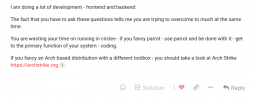Hey guys,
My primary need for an OS is to do "Front End WordPress Website Development". HTML, CSS, JavaScript, WordPress.
As long as a distro is suited for this purpose (like Ubuntu is); i'm happy!
Ubuntu Studio - KDE Plasma - https://ubuntustudio.org/ - Is perfect for me; because it's an audio, video, graphics design, and photography oriented OS.
But what about "Front End Web Development"? Will it handle it well?
THE IMPORTANT QUESTION IS:
- Should i choose whatever Ubuntu Desktop flavour i like and install the audio, video, graphics design, and photography apps that Ubuntu Studio has?
- Or should i choose Ubuntu Studio (considering it was designed, customized and tweaked) to be a creative OS. And install the Front End Development tools that Ubuntu has, and is capable of handling?
- Considering the info provided. What is the best route?
After i make a choice; if the distro works well for my needs; i won't change it until the LTS support is over!
Anyone at all, including those doing Front End WordPress Website Development + audio, video, graphics design, and photography (that could chime in, would be great).
My primary need for an OS is to do "Front End WordPress Website Development". HTML, CSS, JavaScript, WordPress.
As long as a distro is suited for this purpose (like Ubuntu is); i'm happy!
Ubuntu Studio - KDE Plasma - https://ubuntustudio.org/ - Is perfect for me; because it's an audio, video, graphics design, and photography oriented OS.
But what about "Front End Web Development"? Will it handle it well?
THE IMPORTANT QUESTION IS:
- Should i choose whatever Ubuntu Desktop flavour i like and install the audio, video, graphics design, and photography apps that Ubuntu Studio has?
- Or should i choose Ubuntu Studio (considering it was designed, customized and tweaked) to be a creative OS. And install the Front End Development tools that Ubuntu has, and is capable of handling?
- Considering the info provided. What is the best route?
After i make a choice; if the distro works well for my needs; i won't change it until the LTS support is over!
Anyone at all, including those doing Front End WordPress Website Development + audio, video, graphics design, and photography (that could chime in, would be great).


